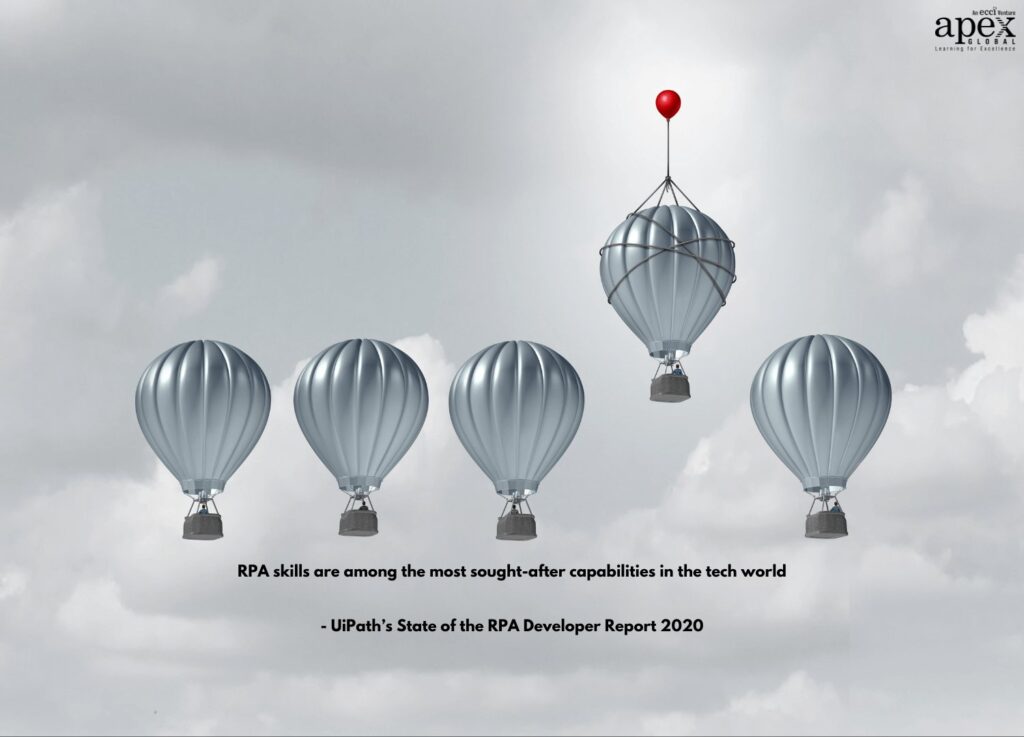In the modern landscape of business automation, a new revolutionary technology has emerged that promises to reshape the way organizations operate – Robotic Process Automation (RPA). RPA is more than just a buzzword; it’s a transformative force that has found its way into various industries, optimizing processes, reducing costs, and enhancing efficiency. The expanding role of RPA in reshaping business processes brings forth a multitude of career possibilities, offering individuals a chance to be at the forefront of technological innovation.
So what is RPA? And what kind of career opportunities does this exciting field offer?
In this blog post, we’ll look at what RPA is, explore the core concepts of RPA, unveil the promising career opportunities it offers, and finally share a list of important steps you need to take to start a career in RPA. Ready to dive in? Let’s go!
What you'll find in this article
What is RPA?

Robotic Process Automation (RPA) is an advanced technology that uses software robots or bots to automate routine, rule-based tasks within various business processes. These bots are designed to mimic humans’ actions & interactions with digital systems, making them adept at handling tasks like data entry, content extraction, form filling, and more. The technology operates on predefined workflows and logic, allowing organizations to achieve streamlined operations without the need for complex and time-consuming coding.
Just imagine a world where routine, mundane tasks no longer demand human attention. RPA steps in as the hero, taking on these responsibilities with precision and speed, thereby freeing human employees to channel their efforts toward creative thinking, strategic planning, and customer engagement. Sounds pretty awesome, right? This shift not only boosts productivity but also cultivates a more fulfilling work environment.
Six key concepts of RPA
Now that we’ve learned what RPA means let’s take a brief look at the following key concepts of RPA before jumping into the career possibilities in the RPA field.
- Image and text automation
- Computer vision activity
- Object repository
- Data manipulation using RPA bots
- Managing your processes from UiPath Orchestrator
- Building a solution with REFramework
I. Image and text automation
RPA goes beyond text inputs and enables bots to understand and interact with images. Bots equipped with Optical Character Recognition (OCR) capabilities can decipher textual content from images and scanned documents. This enables tasks like invoice processing, document categorization, and content extraction from images, revolutionizing industries that deal with vast amounts of unstructured data.
II. Computer vision activity
Computer Vision is a breakthrough concept in RPA, allowing bots to interpret and interact with visual content. Just as humans perceive their environment through sight, RPA bots equipped with computer vision can analyze images, videos, and screenshots. This enables them to identify objects, gauge sentiments, and even assess the authenticity of documents.
III. Object repository
An Object Repository serves as a centralized database storing UI elements and actions. Instead of duplicating efforts by recreating the same UI interactions for different tasks, RPA developers can reuse these stored objects, fostering consistency and reducing development time.
IV. Data manipulation using RPA bots
RPA not only automates processes but also enables data manipulation with precision. Bots can extract data from various sources, manipulate it according to predefined rules, and populate databases or spreadsheets. This concept helps speed up tasks like data migration, data cleaning, and report generation while offering unparalleled accuracy.
V. Managing your processes from UiPath Orchestrator
While RPA revolutionizes how tasks are performed, managing these automated processes seamlessly is equally vital. UiPath Orchestrator steps in as a powerful platform to centrally manage, monitor, and control your fleet of software robots. This application empowers organizations to schedule automation jobs, allocate resources, and track bot performance in real time.
VI. Building a solution with REFramework
The Robotic Enterprise Framework, or REFramework, is a blueprint for developing sustainable RPA solutions. It provides a standardized structure that encapsulates best practices and proven methodologies for building efficient, modular, and adaptable automation processes. With this framework, organizations can build processes that are not only efficient today but adaptable to the ever-evolving demands of tomorrow.
Career opportunities in RPA
So, now that we’ve looked at what RPA is and explored some key concepts of RPA, it’s finally time to learn about the various career possibilities in this intriguing field. Let’s start by discussing the growing demand for RPA professionals.
A. Growing demand for RPA professionals
Organizations are increasingly recognizing the potential of RPA to reshape their processes, optimize workflows, and enhance operational speed. This realization has ignited a race to adopt RPA solutions, driving the demand for skilled professionals who can architect, develop, and manage these transformative systems.

This demand spans diverse sectors, offering professionals with the right skills the chance to contribute across various industries. The future of RPA looks promising as its applications expand into multiple areas such as accounting, financial services, banking, retail, insurance, manufacturing, etc.
As automation is becoming a pivotal driver of efficiency, the demand for RPA professionals is set to persist, making it a good career path for those interested in the automation field.
B. RPA job roles
Now, you may be wondering what type of career path is available for someone who’s interested in this rewarding field. The job titles will vary by company because of the newness of the specialty and potential overlap with other technical roles, but the main RPA job roles are:
- RPA Developer: Architects of automation solutions, RPA developers create bots and design workflows that streamline processes.
- Business Analyst: These professionals bridge the gap between technical teams and business units, identifying automation opportunities aligned with organizational goals.
- RPA Solution Architect: Solution architects design high-level RPA solutions, ensuring they align with the overall enterprise architecture.
- RPA Project Manager: Orchestrates the planning, execution, and monitoring of RPA initiatives, ensuring seamless integration and alignment with organizational goals.
- RPA Support Analyst: These professionals provide ongoing support for deployed RPA solutions. They monitor the robots, address any issues or errors, and make necessary adjustments to ensure smooth functioning.
These set of activities & functions can also be combined and executed within a single role in a company.
C. Growth potential and earning possibilities
With a skill set that’s in high demand and a relatively limited talent pool, RPA professionals command competitive salaries. Moreover, as they gather experience, certifications, and successful projects, their earning potential further grows, positioning them as high-value assets.

Not only that, the demand for RPA professionals transcends industry boundaries. This diverse demand means professionals can pivot across industries, diversifying their experience and positioning themselves as sought-after assets.
As the RPA field grows and evolves, specialization within the field also becomes increasingly valuable. Professionals can specialize in cognitive automation, machine learning integration, or process optimization, becoming experts in niche areas. This specialization not only enhances earning potential but also caters to organizations seeking highly specific automation solutions.
Beyond immediate benefits, RPA professionals also have the potential to ascend into leadership roles. With an in-depth understanding of automation’s impact on operations, these experts can drive strategic decisions, shape digital transformation roadmaps, and oversee larger automation initiatives.
Six steps to start a career in RPA
Whether you’re a recent graduate or a seasoned professional looking to change your career, the path to becoming an RPA expert involves a strategic approach and a commitment to continuous learning. Let’s explore the essential steps that pave the way for a successful RPA career launch.
a. Learn the fundamentals of RPA
Begin by developing a strong foundation in RPA concepts. Understand the basics of automation, the role of software bots, and the impact of RPA on business processes. Resources like online courses, tutorials, exercises, webinars, and introductory books can provide you with the necessary insights to start your journey.
Consider enrolling in specialized courses that offer hands-on training and practical insights like our course “Business Process Automation with UiPath“. This immersive 16-hour training offers a structured learning path, equipping you with the skills needed to excel in RPA using the industry-leading platform UiPath.
b. Sharpen relevant skills
Learn the necessary skills you need to become an RPA professional. Here’s a list of 8 essential skills that form the foundation of an RPA professional’s journey.
- Programming proficiency
- Basic IT knowledge
- Problem-solving
- Process analysis
- Critical thinking
- Industry understanding
- Collaboration & teamwork
- Continuous learning
And don’t just focus on acquiring the necessary skills, make sure to constantly hone them. Keep learning and stay updated on the latest RPA trends, tools, and best practices.
c. Dive into RPA tools and platforms
Diving into RPA tools and platforms involves more than just theoretical understanding. To truly grasp their power, engage in hands-on exploration. Many RPA platforms, including UiPath, offer free trials that grant you access to their tools and resources. Through interactive tutorials, you can explore the platform’s functionalities, experiment with building automation workflows, and witness firsthand how the software bots execute tasks.
d. Gain hands-on experience and build a portfolio
Practice is crucial in RPA. Start with simple projects to automate repetitive tasks and gradually move on to more complex processes. Practical experience will not only strengthen your skills but also help you build a portfolio showcasing your capabilities to potential employers.
e. Get relevant certifications
Many RPA platforms like UiPath offer certification programs that validate your knowledge and skills in using their specific tools. Explore various options and choose the ones that align with your career goals and the tools you’re most comfortable with. Completing these certifications can not only significantly boost your credibility and expertise but also provide you with a competitive edge in the job market.
f. Craft an impressive resume & start exploring job opportunities
Build your resume and make sure to highlight your RPA skills, projects, certifications, and any specialized courses you’ve completed. Then, start applying for entry-level RPA positions, internships, or assistant roles to kickstart your career. During interviews, emphasize your passion for automation, your practical experience, any specialized training you’ve received, and your eagerness to contribute to the organization’s automation initiatives.
Wrapping up
As RPA evolves into a cornerstone of modern business operations, its potential to reshape industries and elevate human potential is boundless. By embracing the transformative trends that lie ahead, individuals and organizations can stride confidently into an era where humans and digital bots work together, forging a path toward unprecedented efficiency and growth.
As you embark on your RPA journey, don’t be afraid to experiment with new techniques and approaches. Test different automation strategies, explore advanced features of RPA tools, and learn from your successes and failures. Also, engage with various RPA communities, forums, and social media groups. Collaborating with peers and professionals can provide insights, solutions to challenges, and different perspectives that enrich your skill set. Finally, remember to assess your progress regularly. Identify areas where you can improve, reflect on your projects, and seek ways to refine your skills.
So, what are you waiting for? Kickstart your career in RPA today by enrolling in our “Business Process Automation with UiPath” course. Let our training equip you with the necessary knowledge and skills to navigate the world of RPA confidently. Take that decisive step forward and unlock a world of endless possibilities in the world of Robotic Process Automation! Learn more about business process automation here.
Have any questions? Reach out to us today at [email protected]. We’d love to hear from you!


